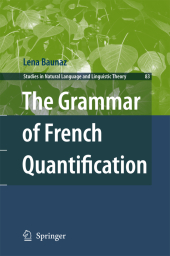 Neuerscheinungen 2013Stand: 2020-01-07 |
Schnellsuche
ISBN/Stichwort/Autor
|
Herderstraße 10
10625 Berlin
Tel.: 030 315 714 16
Fax 030 315 714 14
info@buchspektrum.de |

Lena Baunaz
The Grammar of French Quantification
Repr. d. Ausg. v. 2011. 2013. xii, 260 S. XII, 260 p. 235 mm
Verlag/Jahr: SPRINGER NETHERLANDS; SPRINGER, BERLIN 2013
ISBN: 9400735529 (9400735529)
Neue ISBN: 978-9400735521 (9789400735521)
Preis und Lieferzeit: Bitte klicken
This first extensive study of French Quantification in the field of Syntax provides a typology of four main quantified noun phrases in French (existential, universal, negative and wh-), detailing their syntactic, semantic and prosodic behaviors.
This book is the first extensive study on French Quantification in the field of Syntax. It provides a typology of four main quantified noun phrases in French (existential, universal, negative and wh- ), detailing their syntactic, semantic and prosodic behaviors and showing that they can be reduced to two classes-Split-DP structures or Floating quantification.
Relying on syntax and semantics, the book establishes a three-way structural typology of wh in-situ phrases and extends it to existentials. It pays special attention to the prosodic properties associated with their different readings and proposes an analysis of the distribution of subextraction and pied-piping. Similarly based on semantic and syntactic tests, the book reveals N(egative) words to be universal Quantifiers. It proposes a new structure of N-words in terms of constituent negation and includes a detailed analysis of the difference between not an N and not all the N in French.
List of Abbreviations.- Chapter 1.- 1 Introduction.- 1.1 Proposal.- 1.1.1 Non-canonical Quantification.- 1.1.2 Existential presupposition.- 1.1.3 Chapter 2 (part 1): Wh-phrases in-situ.- 1.1.4 Chapter 2 (part 2) : Existential Quantifiers.- 1.1.5 Chapter 3 : Universal Quantifiers.- 1.1.6 Chapter 4 : Negation and N-words.- 1.2 Outline.- 1.3 Reference list.- Chapter 2.- 2 Introduction Split-Dps.- 2.1 Wh-questions in French.- 2.1.1 Wh-fronting and Wh-reinforced fronting.- 2.1.2 Wh-clefts.- 2.2 Wh in-situ.- 2.2.1 Standard colloquial French.- 2.2.2 Non-standard colloquial French.- 2.3 Split-DPs.- 2.3.1 Evidence for a movement analysis of wh-phrases in-situ phrases in NSC French.- 2.3.2 French Wh-phrases are not necessarily interrogative.- 2.3.3 Combien ... de NP: Obenauer 1983, 1984, 1994 and Mathieu 2002.- 2.3.4 The optionality problem.- 2.4 Existential Qs in French.- 2.4.1 Prosody and Semantics.- 2.4.2 Syntax.- 2.5 The internal structures of Wh and existential un Ns.- 2.6 Conclusion.- 2.7 Reference list.- Chapter 3. 3 Introduction: Floating quantification.- 3.1 Universal Quantifiers: basic facts.- 3.2 Two types of Universal Quantifiers.- 3.2.1 Prosody and Semantics.- 3.2.2 Syntax.- 3.3 Floating Quantifiers (FQs): Doetjes 1997, Fitzpatrick 2006.- 3.4 Conclusion.- 3.5 Reference list.- Chapter 4 .4 Introduction: N-words.- 4.1 French Negation: an overview.- 4.1.1 Sentential Negation, constituent negation, ne and pas.- 4.2 Monotonicity: pas un N vs. Pas tous les.- 4.2.1 pas un N.- 4.2.2 pas tous les N.- 4.2.3 pas is parasitic on Qs.- 4.2.4 The structure of monotone decreasing pas tous and anti-addictive pas un.- 4.2.5 Wrapping up.- 4.3 The Negative status of N-words.- 4.4 French N-words and universal quantifiers.- 4.4.1 Existence and commitment of existence.- 4.5 A typology of N-words.- 4.6 The structure of N-words.- 4.6.1 N-words are (covert) FQs.- 4.7 Conclusion.- 4.8 Reference list.- Chapter 5. 5 Introduction.- 5.1 Locality Effects.- 5.1.1 Relativized Minimality.- 5.1.2 Starke 2001.- 5.2 Redefining the feature-class of Qs: Strength.- 5.2.1 Extracting Qs across Universal quantifiers.- 5.2.2 Comparing existential un N to Wh-phrases in-situ.- 5.2.3 Negation, N-words and intervention effects.- 5.2.4 Wh-phrases and combien-extraction: some differences.- 5.3 Strong Islands.- 5.3.1 Intermediate scope.- 5.3.2 Feature stripping (Baunaz and Puskás 2009).- 5.3 Remaining issues.- 5.4 Conclusion.- 5.5 Reference list.- Chapter 6. 6.1 Results.- 6.1.1 Chapter 2: Split-DPs.- 6.1.2 Chapters 3-4: Floating Quantifiers (FQs).- 6.1.3 Strength.- 6.2 Perspectives.- 6.3 Reference list.- Appendix.- Appendix 1 (to Chapter 4).- Appendix 2 (to Chapter 4).- References.- Index.


